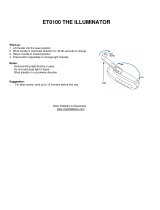
8
Check your local building codes for the proper method of installation. In the absence of local codes, this unit
should be installed in accordance with the National Fuel Gas Code No. Z223.1-1998 USA or CAN/CGA-B149.1/.2
Natural Gas/Propane Code (Canada) latest edition or the National Electrical Code ANSI/NFPA No. 70 or the
Canadian Electrical Code CSA C22.1, 1990 or latest version.
• Before installing built-in grills in enclosures, copy all product information such as model number, serial
number and type of grill (e.g. natural gas or LP) and store information in a safe place.
• If the grill is installed by a professional installer or technician, be sure that he or she shows you where your
gas supply shut-off is located. All gas lines must have a shut-off that is readily and easily accessible. If you
smell gas, check for gas leaks immediately. Check only with a soap and water solution. Never check for gas
leaks with an open flame.
Notice: We strongly recommend professional installation of your Coyote grill. These instructions provide the
measurements necessary to construct a masonry structure to house your outdoor gas grill.
IMPORTANT: Gas fittings, regulator, and installer supplied shut-off valves must be easily accessible.
LOCATION OF YOUR GRILL:
Locate the grill only OUTSIDE in a well-ventilated area. Never locate the grill in a building, garage, breezeway,
shed or other such enclosed areas without an approved ventilation system. When in use, the grill will
generate a lot of smoke. When installing your grill, select an outdoor location that will ensure there is adequate
area for the smoke to dissipate IN ORDER TO AVOID INHALATION OF POTENTIALLY TOXIC FUMES.
Ventilation Requirements for Proper Operation of your Coyote Grill
• Ventilation for a gas grill is absolutely mandatory to ensure that your grill performs as intended and to
ensure the safety of you, your family, and guests. Proper ventilation is necessary to allow heat inside
your grill to escape and also to allow any gas that has leaked from a tank or connection to escape
before a buildup of such gas can occur and possibly ignite. Failure to
provide proper ventilation will nullify Coyote’s warranty and will cause a risk of bodily injury or death.
• If you elect to install your grill into an island, the island itself must be ventilated properly. Any such
island must have a minimum of 2 vents (but optimally 4 vents) per cabinet that has any sort of gas
supply or connection. Each vent must be at least 20 sq. in in size and have access to outside/fresh air.
Those vents will allow heat that is trapped inside due to wind to be able to dissipate out of the island
vents. However, if the island is not ventilated properly and the wind is coming from the back, then the
heat will try to escape through the easiest exit, which will most likely be through the bottom of the grill
and front control panel.
• A simple way to think of what is occurring inside your grill is that when your burners are on, they are
emitting a flame that creates the heat to cook your food. This heat must exhaust or escape from the
grill, otherwise you would eventually have a unit that would not only build up intense heat but also
dangerous pressure. This could cause severe damage to not only the grill but any operators or people
or property near-by. The grill itself allows for ventilation mainly through the rear of the unit above the
rear panel but below the top of the hood. However, wind can act as a barrier to ventilation and
exhaust. This blockage of exhaust can cause problems and hazardous conditions. Therefore, great care
must be taken in selecting a location for your grill and in the installation of it into any masonry island
Locating the Grill





















